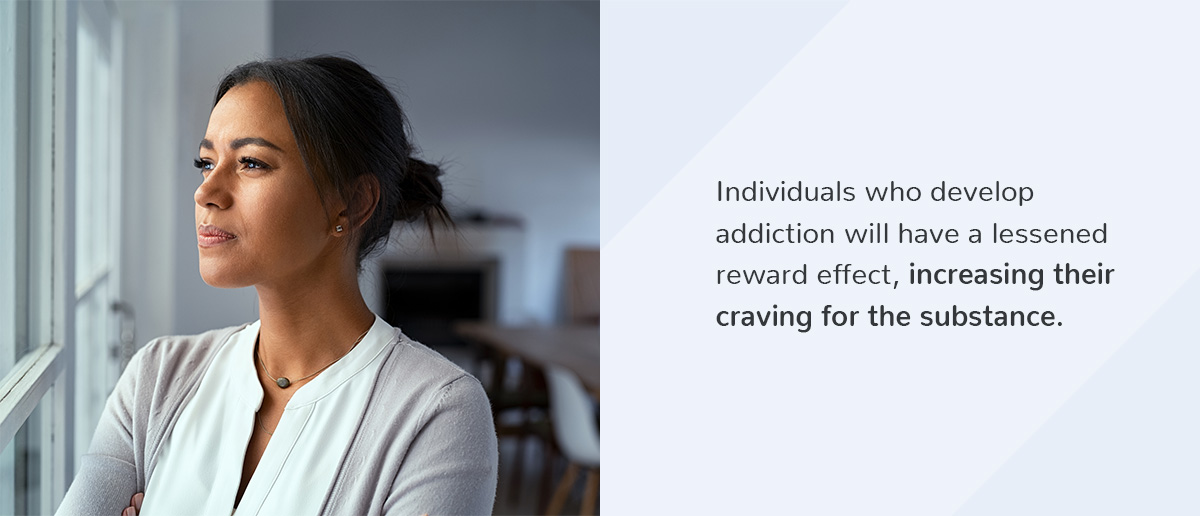According to the Substance Abuse and Mental Health Services Administration (SAMHSA), more than 17% of people aged 12 or older had a substance use disorder (SUD) as of 2022. This percentage, which roughly translates to 49 million people, includes nearly 30 million individuals suffering from alcohol use disorder (AUD). However, many people who struggle with addiction do not seek treatment for various reasons, including negative biases, discrimination, stigma, and fear of failure.
If you or someone you love struggles with addiction or has recently relapsed, know that this is common. Addiction is considered a chronic disease and is defined as an official brain disorder that alters one’s brain chemistry. We’re here to help you better understand this complex medication condition with some FAQs about how addiction affects the brain.
What Makes Drugs Addictive?
All substances have varying effects on the brain. However, alcohol and certain addictive drugs impact the area of the brain responsible for reward, called the basal ganglia. This region of the brain controls the mechanisms of motivation and positive reinforcement, which may contribute to the underlying causes of addiction.
Because the brain’s reward system, also known as the mesolimbic system, associates certain substances and activities with desirable or positive outcomes, individuals often adjust their behavior to search for that specific positive stimulus. The purpose of this reward system is to help reinforce behaviors humans need to survive, such as eating and drinking, and encourage them to continue the behavior.
When you repeatedly use a substance that increases this positive reward, it trains your brain to associate the substance with an overwhelming flood of positive feelings. Soon, your brain will link the substance with pleasure, making it more and more difficult to stop thinking about it. This is how alcohol and drugs become addictive, compelling individuals to seek them out.
How Do Drugs Affect the Brain?
The chemical compounds in prescription or recreational drugs enter the bloodstream and impact the brain on many levels. These substances can include alcohol, opioids, sedatives, nicotine, and stimulants, among many others. Once an individual develops an addiction, their brain begins to crave the reward of the substance.
As the brain’s reward system becomes overstimulated, many individuals struggling with addiction continue their use to achieve the euphoric feelings or “high” they experience when using the substances. This powerful burst of pleasure in the brain can create an intense desire to continue using the substance.
The brain is affected by several factors when it comes to drugs, which include the:
- Frequency of use.
- Stage of addiction the user has developed.
- Type of drug used.
- Amount of drugs used.
Drinking alcohol, for instance, produces pleasurable effects by activating opioid receptors in the nucleus accumbens. In individuals struggling with addiction, the brain associates alcohol intoxication with rewarding effects driven by the person’s physiological state and learned cues of reward. Additionally, once the chemical compounds in the drugs have affected or altered the brain’s chemistry, individuals may experience unpleasant physical symptoms or sensations that feed their need to maintain the habit.
The Relationship Between Dopamine and Addiction

Dopamine plays a vital role in mediating the brain’s value and reward of substance use. This neurotransmitter is responsible for many body functions like pleasure, learning, and motivation. Dopamine acts as a chemical messenger in the brain, releasing positive, pleasurable feelings into its connected pathways when engaging in behaviors necessary for survival.
However, individuals who struggle with addiction will also experience a release of dopamine when using substances like alcohol, heroin, or nicotine. In fact, addictive drugs can produce significantly more dopamine in the brain than non-drug-related rewards — and much more quickly. This means people who use addictive substances receive a “shortcut” to a reward system with an excess of dopamine.
Over time, the brain becomes more tolerant or resistant to dopamine. Individuals who develop addiction will have a lessened reward effect, increasing their craving for the substance. Soon, the substance will no longer provide the flood of pleasure they first experienced, causing them to rely on larger or more frequent amounts to feel the same effect.
Research shows that when drugs cause a surge of dopamine, it teaches an individual’s brain to remember the pleasurable experience. As repeated drug exposure causes certain areas of your brain to become less sensitive, it makes other areas more sensitive — creating feelings of withdrawal. You may experience anxiety and irritability as the drugs wear off, which prompts you to seek the substance to get relief from the discomfort, resulting in a vicious cycle of addiction.
What Drugs Release Dopamine in the Brain?
Addictive substances that can quickly flood the brain with dopamine include:
- Opioids, including Fentanyl, oxycodone (OxyContin), hydrocodone (Vicodin), morphine, and methadone
- Amphetamines, including stimulants like Adderall, Ecstasy (MDMA), and Vyvanse
- Cocaine
- Nicotine
- Heroin
- Alcohol
- Inhalants
- Hallucinogens
- Sedatives
- Hypnotics
What Part of the Brain Controls Addiction?
Though we mentioned the basal ganglia above as the reward system of the brain, two other areas can experience significant changes as a result of substance use, including the extended amygdala and the prefrontal cortex. The regions of the brain are responsible for processing unease, anxiety, and impulse control.
People who struggle with addiction experience withdrawal symptoms and compulsive behaviors as a result of changes to these specific functions. When comparing the addictive brain vs. nonaddictive brain, the most significant difference is often the hyperconnectivity within the reward system.
Repeated use of substances trains widespread areas of the brain to crave immediate gratification from drugs or alcohol, increasing the substance’s motivational value over time. As a result of connectivity changes in the amygdala and prefrontal cortex, individuals experiencing addiction often develop poor decision-making or become indifferent to the negative consequences of their actions.
Recent research also highlights a potentially overlooked area of the brain that plays a role in addiction and addiction recovery — the supplementary motor cortex. The study found that this area of the brain plays a role in the risk of relapse and could be the new target for interventions.
The Impact of Drugs on Neurotransmission
Drugs and substances interfere with the way neurotransmitters naturally function. For instance, heroin can activate neurons and alter the way they send, receive, and process signals because its chemical compounds mimic the natural structure of a neurotransmitter.
However, they do not activate neurons in the same way as the body’s natural neurotransmitter, which results in abnormal, amplified, or disrupted communication in the network. Drugs like cocaine or amphetamines can release substantially large amounts of neurotransmitters, preventing the normal process of these chemicals.
A Path to Wellness Is Possible at Sana
If you or a loved one is struggling with substance abuse or alcohol addiction, you are not alone. Whether it’s your first time seeking treatment or you’re looking for a different approach, you’ll find hope at Sana at Stowe. We provide high-quality, evidence-based addiction treatment blended with impeccable service and compassionate care.
It’s our goal to provide a safe, comfortable, and private environment for you to engage in self-discovery and recovery. Our professional staff will tailor your drug and alcohol treatment experience to your personal needs. To learn more about our serene residential detox and rehab center, call us today or fill out our contact form.
Sana is Here to Help
Sana is here for you and your loved ones. Sana at Stowe provides high-quality treatment for those struggling with substance abuse, alcohol addiction, trauma, and PTSD. Our compassionate and professional staff is dedicated to giving our patients the recovery experience they deserve in a safe and healing environment. To learn more or to get started on your journey to recovery today, give us a call or visit our contact form.
Click here to call us: 866-575-9958




